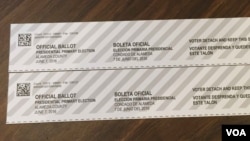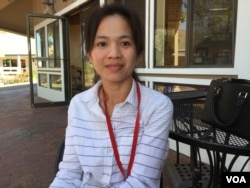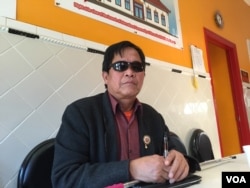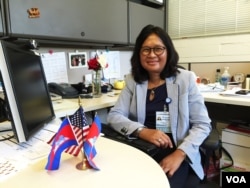Kang Sopha became a US citizenship in 2005, but has not voted in the last two presidential elections.
The now retired 70-year-old understands the importance of civic participation.
She voted in Cambodian elections before immigrating to Oakland in 2000. She rented her house in Pursat province to the UN Transitional Authority in Cambodia’s election mission in the early 1990s. She even worked for Cambodia's National Election Committee for a year.
Kang Sopha is also better educated than earlier Cambodian immigrants, having worked as a primary school teacher after the Khmer Rouge years in the 1970s.
Yet, the obstacles Kang Sopha’s lists as reasons for not voting are similar to those faced by earlier Cambodian residents in Oakland.
In starting a new life in the US, Kang Sopha simply had little time to vote outside of working long hours to support her family. She also struggled with language and cultural barriers in a city that lacks strong Cambodian associations that might have otherwise provided assistance. And, in a country where the car is king, she does not drive.
Now, Kang Sopha is voting in the forthcoming presidential election thanks to the US postal service, and the vote-by-mail process. She first voted by mail in California's primary elections in June after learning about that option to post her vote.
Voting by mail has made the process easy for someone in her situation, she said.
“It's very convenient for those who don't drive, for those who are a little sick, they all can vote just by asking their children to help fill out the ballot once it is mailed to your house,” she told VOA Khmer.
“Voting by mail saves both time and money, especially for elders who don't drive, it is very convenient,” she said.
Many elderly Cambodians in the Oakland area cited the same reasons as Kang Sopha's for not voting this year. If they could simply mail their ballot papers, they would be interested in voting, they said.
Local community leaders and election workers believe that the vote-by-mail system could significantly increase Cambodian voter participation in Oakland.
Citizens still need to register to vote first, a fact made difficult because of the lack of Cambodian associations to help local voters with the process, said Ho Maleny, a Khmer bilingual voter trainer for Alameda County, which includes Oakland.
Once voter registration is completed, voters receive a mail-in ballot paper, which allows them vote easily from home.
“When the real voting period comes, our office will mail ballots and envelopes to them. All they have to do is to tick on the ballot and not forget to sign on the envelope,” Ho Maleny told VOA Khmer.
California also allows registered voters to vote permanently by mail.
At Oakland's Wat Thmey or “new Buddhist temple”, Thach Chhiv said he had never heard of the vote-by-mail option before but the apparent ease of the process had made it an attractive option.
The 62-year-old had never voted before and had recently become visually impaired.
“I'm interested in voting now,” Thach Chhiv told VOA Khmer.
“If I can tick according to what I want, the candidate that I love…and I can mail back the ballot myself.”
With some help and encouragement from local community activists, a few days after this interview, Thach Chhiv was registered to vote by mail in the upcoming presidential election.
But the vote-by-mail system is not without its problems for Khmers-speaking immigrants in Oakland.
Ly Sambo, manager of interpretation services and the refugee health program at an Alameda County hospital, said many older Cambodians, like Thach Chhiv, are still unaware of the vote-by-mail option.
While voting by mail can improve Cambodian voter turnout, she said the system's biggest problem for immigrants is the language barrier, and trust.
“If you vote from home, what language will it be? If it is only in English, there will be a problem for them,” Ly Sambo said.
“Even in Khmer writing, it can still be a problem as they have not been reading Khmer for a long time. So many elders are neither literate enough in English nor Khmer,” she said.
“Their children can help, but in the process might influence their parents' decisions.”
One solution could be to have voting instructions available in an online audio format, Ly Sambo said.
Kang Sopha said she trusts the US postal system, but agreed that the language barrier and trust can be an issue for Cambodian-American families with different political preferences, and where parents heavily depend on their children's better command of English.
“If the children don't follow their parents’ choice of candidate and tick the one [candidate] they personally prefer, than I would not know what to do as parents depend on trust with their children,” Kang Sopha said.
Ho Maleny said another solution could be ballots that include Khmer writing. The vote-by-mail system is already in five major languages and she hopes Khmer will be included in the future, although it is will not be available for the presidential election in November.
Voting by mail starts from October 10 and runs until November 8, the actual presidential election day.
Kang Sopha agreed that Khmer-language instructions on ballot papers would greatly help first time vote-by-mail voters like her.
“It's very good [if it is in Khmer],” she said.
“We can choose the candidate we love and mail back the ballot, without having to depend on the children.”














